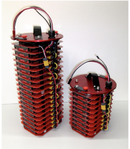Just checked out the Genesis....the downside I see immediately is the battery pack. I have to buy direct from the manufacturer their battery pack...which is fine under some circumstances, but as I travel with too many Lithium batteries already for film work.....the option of buying on site is nice...not to mention most batteries for these DPV's look like home made bombs to the outsider.
Im a big fan of this type of tech.....use what's out there and take advantage of the Scale of batteries built already for a significant price decrease...but more importantly, I wont typically get caught with a dead battery since I can go buy one at the local hardware store.
.....just my thought process....
The Genesis Warp Core uses off-the-shelf 18650 batteries. You can buy them just about anywhere. But, you are a LOT less likely to get caught needing an unexpected battery replacement on a Genesis than you are on a DPV that uses power tool batteries. And you can fly with the Genesis without taking all the batteries out and putting them in your carry-on bag, like you have to do with PTBs.
I replaced all the cells in my Genesis 2.1 last year and it cost about $350. I bought the cells from an online store - not the manufacturer - but it was an online store that the manufacturer suggested as providing known good quality cells.
In contrast, 2 x Dewalt 12Ah PTBs for my BlackTip were about $500 the last time I checked.
Also, the Dewalt PTBs are... well, they have ZERO Quality Control done on them to confirm their suitability for use in a DPV.
I bought 2 x Dewalt 12 Ah PTBs brand new, together, at the same time I bought my BlackTip. They have always been charged in my Dewalt 4-bay charger, together, at the same time, and only ever been used, together, in my BlackTip. I don't even own any other device that would use those batteries.
After my BlackTip was a year or 2 old, I started having issues with it cutting out randomly. Like, I'm scootering along and it just stops. The reason? The BlackTip controller detects a voltage imbalance and shuts down. Why does it get a voltage imbalance? Because one of the PTBs is dropping in voltage more quickly than the other. Why? Well, because they were not designed to be used like they are being used in a BlackTip, and they have zero QC to ensure that they will work correctly when used like that.
Dewalt doesn't QC them for that kind of usage and neither does Dive-X.
I don't KNOW, because I've not owned a Cuda X or any other Dive-X DPV that uses PTBs, but I suspect that they would be susceptible to the same issue. Maybe even more so if it's a DPV that uses 4 PTBs instead of 2, like in my BlackTip.
My opinion is that PTBs were a good idea for a scooter at the sub-$2000 price point. It's an entry-level price point for an entry-level scooter that people should be using to have fun with on recreational dives.
But, PTBs are a terrible idea for any scooter in the "Big Boy" price range - or any mission-critical usage scenario. They are not as reliable as dedicated solutions. And they have significantly inferior energy density compared to dedicated solutions. I.e. A Genesis 3.1 is the same size and weight as a Cuda X Tech, yet gives way more run time/range (8.7 miles vs 5.6).





